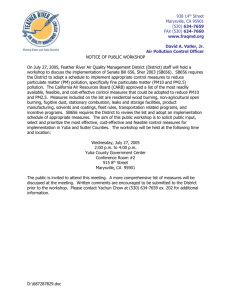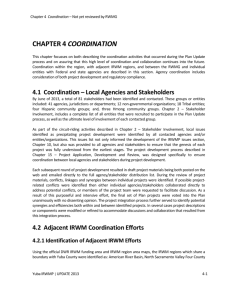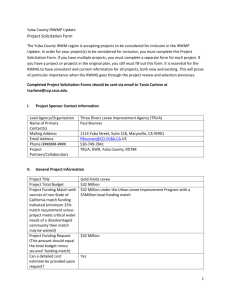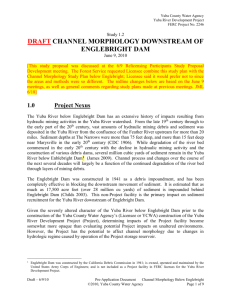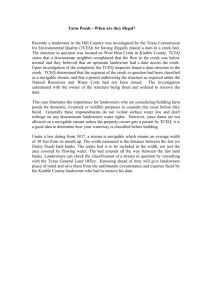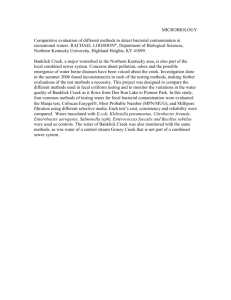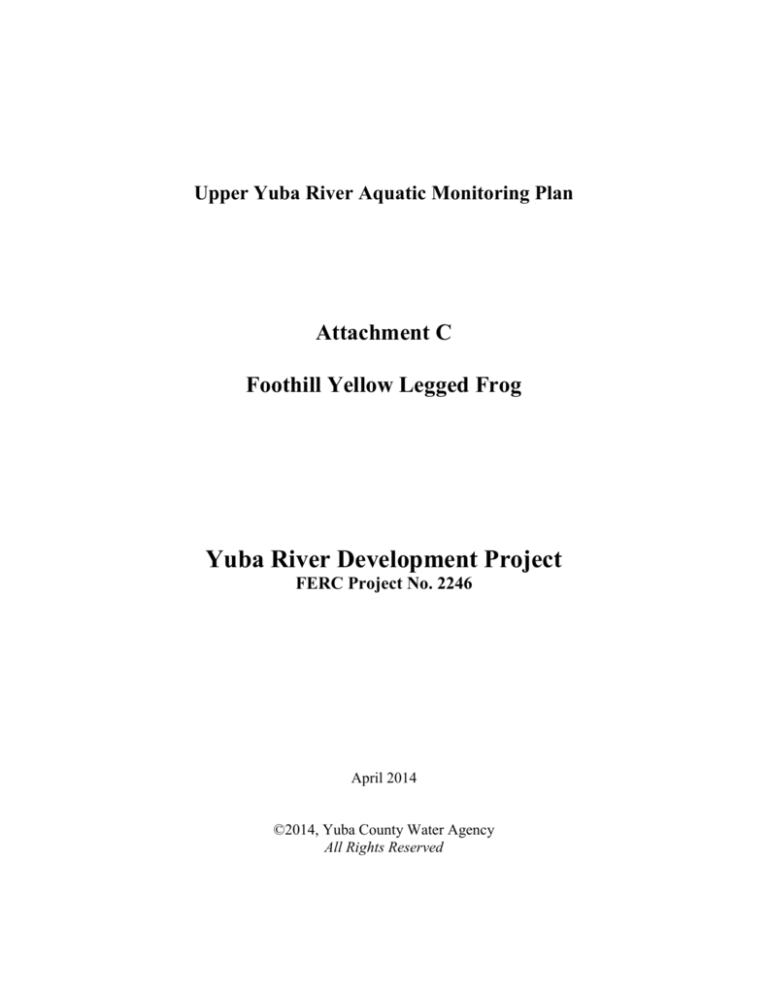
Upper Yuba River Aquatic Monitoring Plan
Attachment C
Foothill Yellow Legged Frog
Yuba River Development Project
FERC Project No. 2246
April 2014
©2014, Yuba County Water Agency
All Rights Reserved
Yuba County Water Agency
Yuba River Development Project
FERC Project No. 2246
Section No.
1.0
2.0
Table of Contents
Description
Page No.
Introduction ...................................................................................................................... C-1
Summary of Results by Reach ......................................................................................... C-1
2.1
Our House Diversion Dam Reach....................................................................... C-1
2.2
Oregon Creek Reach ........................................................................................... C-2
2.3
Middle/North Yuba River Reach ........................................................................ C-3
2.4
New Bullards Bar Dam Reach ............................................................................ C-3
2.5
Log Cabin Diversion Dam Reach ....................................................................... C-4
Figure No.
List of Figures
Description
Page No.
List of Tables
Description
Page No.
None.
Table No.
2.1-1.
2.2-1.
2.3-1.
2.5-1.
April 2014
Summary of FYLF surveys and other information regarding the
distribution of FYLF in the Middle Yuba River downstream of Our House
Diversion Dam. ....................................................................................................C-1
Summary of FYLF surveys and other information regarding the
distribution of FYLF in the Middle Yuba River downstream of Oregon
Creek Confleunce.................................................................................................C-2
Summary of FYLF surveys and other information regarding the
distribution of FYLF in the Yuba River downstream of Middle
Yuba/North Yuba Confluence at Sites YR-1, YR-2, and YR-2A. ......................C-3
Summary of FYLF surveys and other information regarding the
distribution of FYLF in Oregon Creek downstream of Log Cabin
Diversion Dam at Sites OC-1 and OC-2. .............................................................C-4
Upper Yuba River Aquatic Monitoring Plan
©2014, Yuba County Water Agency
Attachment C
Page TOC-i
Yuba County Water Agency
Yuba River Development Project
FERC Project No. 2246
Page Left Blank
Attachment C
Page TOC-ii
Upper Yuba River Aquatic Monitoring Plan
©2014, Yuba County Water Agency
April 2014
Yuba County Water Agency
Yuba River Development Project
FERC Project No. 2246
1.0
Introduction
Foothill yellow-legged frog (FYLF) monitoring will be conducted in stream reaches where
known breeding populations of FYLF exist and where data are needed to assess response to
flow-related changes in conditions during the new license. Where possible, sampling sites will
be at the same locations as relicensing Study 3.4, Special Status Amphibians – Foothill Yellowlegged Frog Surveys to allow for comparison to conditions prior to new license measure
implementation.
In 2011 and 2012, YCWA conducted visual encounter surveys (VES) at 10 sites within the
watershed. No FYLF of any life stage were found at five sites. Detections of one or more life
stages of FYLF were recorded at all other sites. Incidental observations of FYLF recorded
during performance of YCWA’s other relicensing studies and historical records of FYLF largely
conformed to the patterns documented by FYLF surveys. A summary of data collected during
the relicensing study in the proposed future monitoring areas are below.
2.0
Summary of Results by Reach
2.1
Our House Diversion Dam Reach
The Our House Diversion Dam Reach is a 7.9 mile (mi)-long section of the Middle Yuba River
from the base of Our House Diversion Dam (elevation, or El., 2,032 ft) at RM 12.6 to the
upstream confluence of the Middle Yuba River and Oregon Creek (El. 1,430 ft) at RM 4.7. The
reach has a gradient of 1.2 percent.
Two FYLF survey sites representing a total distance of 1.2 mi were located between Our House
Diversion Dam and the confluence of Oregon Creek, MYR-4 just below Our House Diversion
Dam (RM 12.5) and MYR-3B extending nearly 1 mile upstream from Oregon Creek (RM 5.0).
The survey results at the sites in Our House Diversion Dam Reach included no FYLF egg
masses; however, there were detections of all other FYLF life stages during surveys, indicating
that breeding had occurred (Table 2.1-1).
Table 2.1-1. Summary of FYLF surveys and other information regarding the distribution of FYLF
in the Middle Yuba River downstream of Our House Diversion Dam.
Survey Summary and Incidental Observations
Potential FYLF Breeding and Rearing Habitat at Survey Sites
MIDDLE YUBA RIVER, OUR HOUSE DIVERSION DAM REACH: SITES MYR-3B AND MYR-4
FYLF, including tadpoles, found at both survey sites and observed
incidentally elsewhere on the reach. A total of 23 metamorphosed
Potential habitat was abundant in Site MYR-3B, associated with slow
young-of-year FYLF were documented at Site MYR-3B, but only one
moving water in pool tail-outs, and shallow edgewater throughout the
was found at Site MYR-4. Large numbers of Sierra newts were
reach. In Site MYR-4, potential habitat occurred in areas of lowobserved during surveys and incidentally, especially at Site MYR-3B,
velocity edgewater along run and glide sections.
along with moderate numbers of American bullfrogs at Site MYR-3B
and one observation at Site MYR-4.
April 2014
Upper Yuba River Aquatic Monitoring Plan
©2014, Yuba County Water Agency
Attachment C
Page C-1
Yuba County Water Agency
Yuba River Development Project
FERC Project No. 2246
Other amphibians detected during surveys were Sierra newt, Sierran treefrog (Pseudacris sierra),
and American bullfrog. Adult Sierra newts were particularly abundant at Site MYR-3B.
American bullfrog tadpoles were found in pool habitat at Site MYR-3B. Sierran treefrog
tadpoles were found at each of the Middle Yuba River below Our House Diversion Dam.
Based on the developmental stages of FYLF tadpoles found during surveys in 2012, water
temperature data, and observations from other streams, FYLF breeding in the Middle Yuba River
downstream of Our House Diversion Dam may have begun on about May 1 and concluded by
mid-May. An earlier brief warm period, which peaked on April 21 with a water temperature of
about 15°C before dropping again, could also have triggered limited breeding, although this was
not confirmed by the survey results.
2.2
Oregon Creek Reach
The Oregon Creek Reach is a 4.7 mi long section of the Middle Yuba River from the confluence
of the Middle Yuba River and Oregon Creek at RM 4.7 (El. 1,430 ft) to the confluence of the
Middle Yuba River with the North Yuba River at RM 0.0 (El. 1,120 ft). The reach has a gradient
of 1.2 percent.
Three sites representing a total distance of 1.15 mi were located between Oregon Creek and the
confluence of the North Yuba River. MYR-3A extended about 0.3 mi downstream from the
confluence of Oregon Creek, MYR-2 was situated at the confluence of Yellowjacket Creek, and
MYR-1 extended 0.25 mi upstream of the North Yuba River.
Downstream of the confluence of Oregon Creek, FYLF breeding was documented only at the
confluence site. There were no FYLF survey detections at the other two sites and only one
incidental observation from another YCWA study of FYLF at one of the sites (MYR-2). In
response to this detection, YCWA surveyed the adjacent tributary, Yellowjacket Creek, in 2013;
however, no FYLF were found. Yellowjacket Creek is a small stream lacking suitable FYLF
breeding habitat (Table 2.2-1).
Table 2.2-1. Summary of FYLF surveys and other information regarding the distribution of FYLF
in the Middle Yuba River downstream of Oregon Creek Confleunce.
Survey Summary and Incidental Observations
Potential FYLF Breeding and Rearing Habitat at Survey Sites
MIDDLE YUBA RIVER, OREGON CREEK REACH: SITES MYR-1, MYR-2, AND MYR-3A; AND YELLOWJACKET CREEK
FYLF found during surveys only at Site MYR-3A, where there were
two detections, a juvenile and egg mass. At Site MYR-2, one adult
FYLF was observed incidentally. No young-of-year FYLF were Potential habitat was most common in Sites MYR-2 and MYR-3A,
documented at survey sites, but six juveniles, likely including which both had slow-moving water in pool tail-outs, and areas of
metamorphosed young-of-year, were observed in another part of the shallow edgewater throughout. In Site MYR-1 potential habitat is
reach near Moonshine Creek in August 2012. Detections of Sierra limited to parts of the right bank and included low gradient riffles,
newts were numerous during surveys at Site MYR-2 and there were runs and glides, backwater pools, with edgewater mostly concentrated
large numbers of American bullfrogs at each site. Crayfish were found at the downstream end of the site.
at Site MYR-3A. Juvenile American bullfrogs were found in
Yellowjacket Creek during Study 3.13.
Other amphibians detected during surveys were Sierra newt, Sierran treefrog (Pseudacris sierra),
and American bullfrog. Adult Sierra newts were particularly abundant at Site MYR-2.
Attachment C
Page C-2
Upper Yuba River Aquatic Monitoring Plan
©2014, Yuba County Water Agency
April 2014
Yuba County Water Agency
Yuba River Development Project
FERC Project No. 2246
American bullfrog tadpoles were the most commonly detected amphibians at sites downstream
of Oregon Creek and particularly abundant at Site MYR-2 and MYR-3A. Sierran treefrog
tadpoles were found at each of the Middle Yuba River sites except MYR-1.
Based on the developmental stages of FYLF tadpoles found during surveys in 2012, water
temperature data, and observations from other streams, FYLF breeding in the Middle Yuba River
downstream of Our House Diversion Dam may have begun on about May 1 and concluded by
mid-May. An earlier brief warm period, which peaked on April 21 with a water temperature of
about 15°C before dropping again, could also have triggered limited breeding, although this was
not confirmed by the survey results.
2.3
Middle/North Yuba River Reach
The Middle/North Yuba River Reach is a 5.8 mi long section of the Yuba River from the
confluence of the North Yuba River with the Middle Yuba River at RM 40.0 (El. 1,120 ft) to the
New Colgate Powerhouse at RM 34.2 (El. 540 ft). The overall gradient is less than 2 percent,
though there are steeper sections with a map-gradient of near 5 percent.
Two FYLF survey sites, representing a total distance of 0.7 mi were located in the Middle/North
Yuba River Reach of the Yuba River under Study 3.4, Site YR-1 situated about 0.37 mi
upstream of New Colgate Powerhouse and YR-2 just downstream of the confluence of the North
Yuba River. American bullfrog tadpoles were numerous at the survey sites and bass occurred
throughout YR-2 (Table 2.3-1). There were no survey detections of FYLF at the survey sites and
no reported incidental observations from other studies of FYLF in the reach. Surveys for FYLF
were performed again in 2013 under Study 3.13 at Site YR-2A, which included Site YR-2, but
expanded to about 0.12 mi in length. The surveys were performed in summer when flows were
low to allow for increased survey accessibility. Once again, there were no detections of FYLF.
Established FYLF populations likely do not occur in this reach. Because there are no apparent
barriers to dispersal at lower flows, individual FYLF may nonetheless occur infrequently.
Table 2.3-1. Summary of FYLF surveys and other information regarding the distribution of FYLF
in the Yuba River downstream of Middle Yuba/North Yuba Confluence at Sites YR-1, YR-2, and
YR-2A.
Survey Summary and Incidental Observations
No FYLF found during surveys or observed incidentally. American
bullfrog detections were numerous at the survey sites, with larvae more
abundant at Site YR-1. The only observations of Sierra newt were two
adults observed incidentally on the stream bank in January 2012 at Site
YR-1. One Sierran treefrog tadpole was found at YR-1. Crayfish were
also found at the sites.
2.4
Potential FYLF Breeding and Rearing Habitat at Survey Sites
Potential habitat is limited in extent in the reach. In Site YR-2
potential habitat was associated with a single main-channel pool and
tail-out. Within the expanded Site YR-2A, the only additional
potential habitat for FYLF was associated with edgewater in the
higher gradient section downstream of the pool. Potential habitat in
Site YR-1 was associated with a low-gradient riffle and mid-channel
pool at the downstream end of the site.
New Bullards Bar Dam Reach
The New Bullards Bar Dam Reach is a 2.4 mi long section of the North Yuba River from the
base of New Bullards Bar Dam at RM 2.4 (El. 1,360 ft) to the confluence of the North Yuba
April 2014
Upper Yuba River Aquatic Monitoring Plan
©2014, Yuba County Water Agency
Attachment C
Page C-3
Yuba County Water Agency
Yuba River Development Project
FERC Project No. 2246
River with the Middle Yuba River at RM 0.0 (El. 1,125 ft). The reach has a gradient of 1 percent
to 3 percent, expect for a short 0.2 mile section with a gradient of 3 percent to 8 percent.
One FYLF survey site, 0.55 mi long, was situated in the North Yuba River extending up from the
confluence with the Middle Yuba River. The only amphibians found during surveys at the site
or reported from the reach as incidental observations from other studies were Sierra newt,
American bullfrog, and Sierran treefrog (Table 2.4-1). Potential habitat for FYLF is scarce.
Table 2.4-1. Summary of FYLF surveys and other information regarding the distribution of FYLF
in the North Yuba River downstream of New Bullards Bar Dam at Site NYR-1.
Survey Summary and Incidental Observations
Potential FYLF Breeding and Rearing Habitat at Survey Sites
No FYLF found during surveys or observed incidentally. Moderate Potential habitat is scarce in the reach and within the site was limited
numbers of detections of American bullfrog and Sierra newt occurred to pool tail-outs and some shallow edgewater associated with midduring surveys. Sierran treefrog tadpoles and juveniles also found.
channel pools. Substrate is mostly bedrock and massive boulders.
2.5
Log Cabin Diversion Dam Reach
The Log Cabin Diversion Dam Reach is a 4.3 mi long section of Oregon Creek from the Log
Cabin Diversion Dam at RM 4.3 to the confluence of Oregon Creek with the Middle Yuba River
at RM 4.7. The 3.6 miles of this reach has a gradient of 1 percent to 3 percent while the
remained section has a gradient of 3 percent to 8 percent.
Two FYLF survey sites were located in Oregon Creek downstream of Log Cabin Diversion
Dam, Site OC-1 situated at the confluence of the Middle Yuba River (0.6 mi long) and OC-2 in
Celestial Valley (0.65 mi long). The survey results did not include egg mass detections;
however, a small number of tadpoles were found at Site OC-2, indicating that breeding had
occurred (Table 2.5-1). There were FYLF detections at both survey sites and incidental
observations were reported from other studies throughout the reach. Breeding locations may be
scattered, particularly in low gradient sections, such as in Celestial Valley. Incidental
observations suggest that more young-of-year (YOY) FYLF occurred in 2009 and 2012 than in
2011.
Table 2.5-1. Summary of FYLF surveys and other information regarding the distribution of FYLF
in Oregon Creek downstream of Log Cabin Diversion Dam at Sites OC-1 and OC-2.
Survey Summary and Incidental Observations
Potential FYLF Breeding and Rearing Habitat at Survey Sites
FYLF found at both survey sites and observed incidentally elsewhere
on the reach. Small numbers of tadpoles were found at Site OC-2. No
metamorphosed young-of-year were observed during the surveys;
Potential habitat present throughout both sites associated with lowhowever, young-of-year were noted incidentally at scattered locations
velocity edgewater areas along mid-channel pools and low-gradient
during other studies in 2009 and 2012. There were numerous
riffles.
detections of Sierra newts during the surveys at both sites. Two postmetamorphic Sierran treefrogs were detected at OC-2. Crayfish were
found at Site OC-1.
FYLF breeding in Oregon Creek downstream of Log Cabin Diversion Dam in 2011 probably
occurred in June. Water temperatures in the Log Cabin Diversion Dam Reach held favorable for
Attachment C
Page C-4
Upper Yuba River Aquatic Monitoring Plan
©2014, Yuba County Water Agency
April 2014
Yuba County Water Agency
Yuba River Development Project
FERC Project No. 2246
breeding by the first week of June. Upstream of the diversion dam, FYLF egg masses, some less
than one week old, were found during the June 15 survey.
April 2014
Upper Yuba River Aquatic Monitoring Plan
©2014, Yuba County Water Agency
Attachment C
Page C-5
Yuba County Water Agency
Yuba River Development Project
FERC Project No. 2246
Page Left Blank
Attachment C
Page C-6
Upper Yuba River Aquatic Monitoring Plan
©2014, Yuba County Water Agency
April 2014

